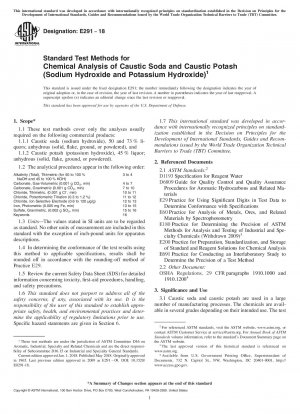ASTM E291-18
Standard Test Methods for Chemical Analysis of Caustic Soda and Caustic Potash (Sodium Hydroxide and Potassium Hydroxide)
- Standard No.
- ASTM E291-18
- Release Date
- 2018
- Published By
- American Society for Testing and Materials (ASTM)
- Latest
- ASTM E291-18
- Scope
- 1.1 These test methods cover only the analyses usually required on the following commercial products: 1.1.1 Caustic soda (sodium hydroxide), 50 and 73 % liquors; anhydrous (solid, flake, ground, or powdered), and 1.1.2 Caustic potash (potassium hydroxide), 45 % liquor; anhydrous (solid, flake, ground, or powdered). 1.2 The analytical procedures appear in the following order: Alkalinity (Total), Titrimetric (for 50 to 100 % NaOH and 45 to 100 % KOH) 3 to 4 Carbonate, Gas-Volumetric (0.001 g CO2, min) 4 to 7 Carbonate, Gravimetric (0.001 g CO2, min) 7 to 10 Chloride, Titrimetric, (0.001 g Cl− , min) 10 to 11 Chloride, Potentiometric Titration (0.3 to 1.2 %) 11 to 12 Chloride, Ion Selective Electrode (0.6 to 120 µg/g) 12 to 13 Iron, Photometric (0.005 mg Fe, min) 13 to 15 Sulfate, Gravimetric, (0.002 g SO3, min) 15 to 16 Keywords 16 1.3 Units—The values stated in SI units are to be regarded as standard. No other units of measurement are included in this standard with the exception of inch-pound units for apparatus descriptions. 1.4 In determining the conformance of the test results using this method to applicable specifications, results shall be rounded off in accordance with the rounding-off method of Practice E29. 1.5 Review the current Safety Data Sheet (SDS) for detailed information concerning toxicity, first-aid procedures, handling, and safety precautions. 1.6 This standard does not purport to address all of the safety concerns, if any, associated with its use. It is the responsibility of the user of this standard to establish appropriate safety, health, and environmental practices and determine the applicability of regulatory limitations prior to use. Specific hazard statements are given in Section 6. 1.7 This international standard was developed in accordance with internationally recognized principles on standardization established in the Decision on Principles for the Development of International Standards, Guides and Recommendations issued by the World Trade Organization Technical Barriers to Trade (TBT) Committee.
ASTM E291-18 Referenced Document
- ASTM D1193 Standard Specification for Reagent Water
- ASTM D6809 Standard Guide for Quality Control and Quality Assurance Procedures for Aromatic Hydrocarbons and Related Materials*, 2020-10-01 Update
- ASTM E180 Standard Practice for Determining the Precision of ASTM Methods for Analysis and Testing of Industrial and Specialty Chemicals
- ASTM E200 Standard Practice for Preparation, Standardization, and Storage of Standard and Reagent Solutions for Chemical Analysis
- ASTM E29 Standard Practice for Using Significant Digits in Test Data to Determine Conformance with Specifications
- ASTM E60 Standard Practice for Analysis of Metals, Ores, and Related Materials by Molecular Absorption Spectrometry
- ASTM E691 Standard Practice for Conducting an Interlaboratory Study to Determine the Precision of a Test Method
ASTM E291-18 history
- 2018 ASTM E291-18 Standard Test Methods for Chemical Analysis of Caustic Soda and Caustic Potash (Sodium Hydroxide and Potassium Hydroxide)
- 2009 ASTM E291-09 Standard Test Methods for Chemical Analysis of Caustic Soda and Caustic Potash (Sodium Hydroxide and Potassium Hydroxide)
- 2004 ASTM E291-04 Standard Test Methods for Chemical Analysis of Caustic Soda and Caustic Potash (Sodium Hydroxide and Potassium Hydroxide)
- 2001 ASTM E291-01 Standard Test Methods for Chemical Analysis of Caustic Soda and Caustic Potash (Sodium Hydroxide and Potassium Hydroxide)
- 1996 ASTM E291-96 Standard Test Methods for Chemical Analysis of Caustic Soda and Caustic Potash (Sodium Hydroxide and Potassium Hydroxide)
